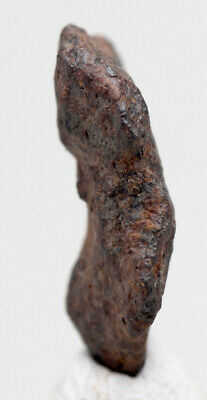-40%
RARE GIBEON IRON METEORITE FRAGMENT SPECIMEN COMPLETE INDIVIDUAL NAMIBIA AFRICA
$ 2.63
- Description
- Size Guide
Description
This specimen weighs 2.00 grams. It measures 16 mm x 10 mm x 5 mm.I offer a shipping discount for customers who combine their payments for multiple purchases into one payment!
The discount is regular shipping price for the first item and just 50 cents for each additional item!
To be sure you get your shipping discount just make sure all the items you want to purchase are in your cart.
Auctions you win are added to your cart automatically.
For any "buy it now" items or second chance offers, be sure to click the "add to cart" button, NOT the "buy it now" button.
Once all of your items are in your cart just pay for them from your cart and the combined shipping discount should be applied automatically.
I offer a money back guarantee on every item I sell.
If you are not 100% happy with your purchase just send me a message to let me know
and I will buy back the item for your full purchase price.
Hi there, I am selling this Amazing Gibeon Iron Meteorite! Meteorites are one of the RAREST materials on earth, more rare than diamonds!!!! This one fell in Namibia South Africa. If you have any questions, do not hesitate to ask me. Have fun bidding, thanks so much for visiting my auction and have a great day!
If you purchase from me you should know that the authenticity of this meteorite is guaranteed!
I am a member of the IMCA or the International Meteorite Collector's Association. This is an organization that is a check and balance of those who collect, trade and sell meteorites. You can only join this organization by having the utmost integrity. You must to have two references from existing members to get in and a good reputation. Members of this organization maintain a high standard by monitoring each others' activities for accuracy and honesty. It is every IMCA member's responsibility and pleasure to offer help and assistance to fellow members in order to ensure specimens are genuine. It is not wise to purchase meteorites on Ebay or other sources from those who are not IMCA members. This is a very tight-knit community made up of meteorite hunters, dealers, collectors, and scientists who look out for each other to make sure that the meteorites offered to the public are authentic and genuine. I encourage you to visit the IMCA website and get more information on what being a member means, and how your purchases from its members are guaranteed.
IMCA Member #7446
Below is some information about this meteorite:
Gibeon (meteorite)
From Wikipedia, the free encyclopedia
Jump to navigationJump to search
Gibeon
Gibeon-meteorite-in-Post-Street-Mall.jpg
Gibeon meteorites in Post Street Mall, Windhoek
Type
Iron
Structural classification
Fine octahedrite
Group
IVA[1]
Composition
91,8% Fe; 7,7% Ni; 0,5% Co; 0,04% P; 2,4 ppm Ir; 1,97 ppm Ga; 0,111 ppm Ge
Country
Namibia
Region
Great Namaqualand
Coordinates
25°20′S 18°00′ECoordinates: 25°20′S 18°00′E
Observed fall
No
Fall date
prehistoric times
Found date
1838[1]
TKW
26000 kg[1]
Strewn field
Yes
Widmanstätten pattern kevinzim.jpg
Widmanstätten pattern
Commons page Related media on Wikimedia Commons
Gibeon is a meteorite that fell in prehistoric times in Namibia. It was named after the nearest town: Gibeon.
Contents
1
History
2
Strewn field
3
Composition and classification
4
See also
5
References
6
External links
History
The meteorite was discovered by the Nama people and used by them to make tools and weapons.
In 1836[1] the English captain J. E. Alexander collected samples of the meteorite in the vicinity of the Fish River and sent them to London. There John Herschel analyzed them and confirmed for the first time the extraterrestrial nature of the material.
Post Street Mall & Gibeon Meteorite
Between 1911 and 1913, 33 fragments of the meteorite were collected in the vicinity of Gibeon and brought to the capital Windhoek. They weighed between 195 and 506 kilograms (430 and 1,116 lb) and were first stored, then displayed at Zoo Park as a single heap. In 1975 a public fountain displaying the meteorite fragments was planned. The pieces were removed and stored at Alte Feste, where two of the fragments were stolen. The fountain was erected in Post Street Mall, with two empty pillars for the missing fragments. Since then, two more fragments were removed from the fountain, so that it displays only 29 today.[2]
The collection displayed on the fountain in Windhoek's Central Business District was proclaimed a National Monument (Category: geology) on 15 February 1950. Additionally, all meteorites found in Namibia are automatically protected as National Monuments and must not be removed from where they have been found, nor damaged in any way.[2]
Strewn field
The fragments of the meteorite in the strewn field are dispersed over an elliptical area 390 kilometres (240 mi) long and 120 kilometres (75 mi) wide. The core of this area is situated near the village of Gibeon in Namibia's Hardap Region. About 100–150 different fragments have been collected over time, and additional pieces are still found occasionally.[2]
Composition and classification
Gibeon full slice, NMNH
The term Gibeon encompasses the whole meteoritic material fallen from the sky during this fall. This material is classified as iron meteorite belonging to the chemical group IVA.[1]
Gibeon meteorites are composed of an iron-nickel alloy containing significant amounts of cobalt and phosphorus. The crystal structure of this meteorite provides a classic example of fine octahedrite and the Widmanstätten pattern is appreciated for its beauty both by collectors and designers of jewelry.











